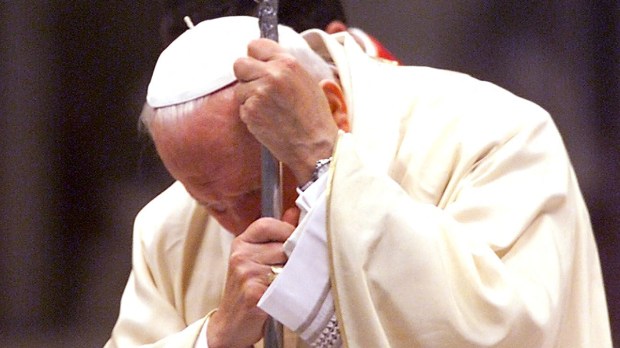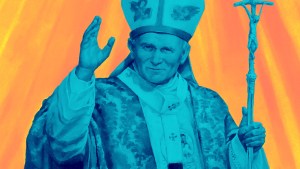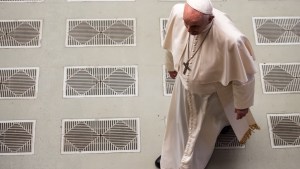In Greece, Pope Francis has followed in the footsteps of Pope John Paul II in asking forgiveness of the Orthodox for the mistakes made by Catholics — “actions and decisions that had little or nothing to do with Jesus and the Gospel, but were instead marked by a thirst for advantage and power” and that “gravely weakened our communion.”
In a moving reflection during a meeting with His Beatitude Hieronymos II, he nevertheless invited Christians of both confessions to lean on their common roots.
Just hours after landing from Cyprus, the Pope was received by the Primate of All Greece. This meeting was the second between the two men, after that of 2016 in Lesbos.
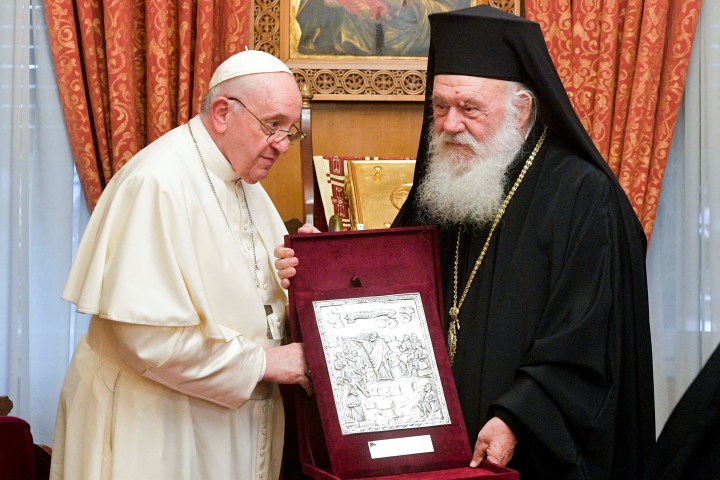
The Pope’s reflection centered on the symbolism of the olive tree.
A short time ago, I mentioned the age-old olive trees that our lands have in common. Reflecting on those trees that unite us, I think of the roots we share. Underground, hidden, frequently overlooked, those roots are nonetheless there and they sustain everything.
What are our common roots that have endured over the centuries? They are the apostolic roots. Saint Paul speaks of them when he stresses the importance of being “built upon the foundation of the apostles” (Eph 2:20). Those roots, growing from the seed of the Gospel, began to bear abundant fruit precisely in Hellenic culture: I think of the early Fathers of the Church and the first great ecumenical councils.
The fruitfulness, though, was “compromised by division,” the Pope said, and asked for forgiveness. “Tragically, in later times we grew apart. Worldly concerns poisoned us, weeds of suspicion increased our distance and we ceased to nurture communion.”
Yet we are comforted by the certainty that our roots are apostolic and that, notwithstanding the twists and turns of time, what God planted continues to grow and bear fruit in the same Spirit. It is a grace to recognize one another’s good fruits and to join in thanking the Lord for this.
A few minutes earlier, Hieronymus II had asked, without wanting to “embarrass” Pope Francis, that the latter have the courage and the honesty to consider the missing signs and omissions of his predecessors.
The Orthodox Patriarch alluded to the Greek War of Independence. According to a specialist in the Orthodox world contacted by I.MEDIA, in 1821, the Western powers and the Vatican had not supported the civil and civic resistance movement of the Greeks then under Ottoman influence.
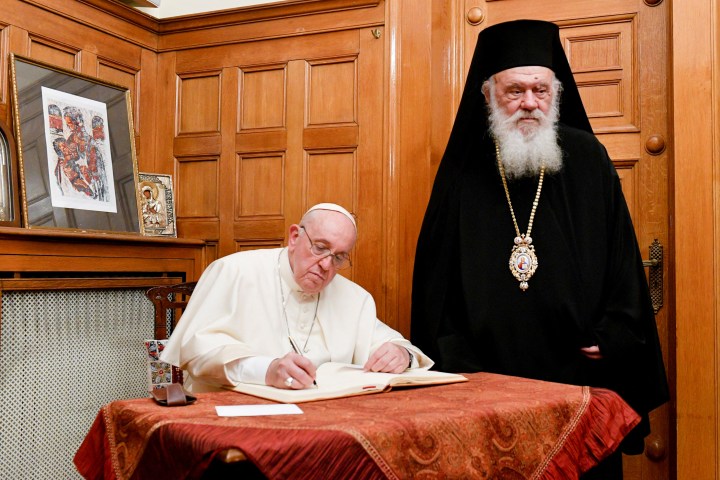
The Spirit’s work
Carrying on with the symbol of the olive trees common to Rome and Greece, the Pope spoke of olive oil:
For us, dear Brother, oil calls to mind the Holy Spirit who gave birth to the Church. Only he, with his unfading splendour, can dispel the darkness and illumine the steps of our journey.
As well, the Pope reflected, Jesus asks us to pray.
In Gethsemane, in his hour of anguish, Christ asked his disciples for the comfort of their closeness and prayer. The image of oil thus leads us to the Garden of Olives. “Remain here and watch” (Mk 14:34), Jesus said. His request to the Apostles was in the plural. Nowadays, too, he wants us to watch and pray. We need prayer for one another in order to bring to the world God’s consolation and to heal our wounded relationships.
He was insistent that Christians must seek communion:
How can we testify before the world to the harmony of the Gospel, if we Christians remain separated? How can we proclaim the love of Christ who gathers the nations, if we ourselves are not united? Many steps have already been taken to bring us together. Let us implore the Spirit of communion to spur us to follow his lead and to help us base communion not on calculations, strategies and expedience, but on the one model to which we must look: the Most Holy Trinity.
Help from the Orthodox on the question of synodality
The Successor of Peter also paid homage to the solidity of the theological formation within the Orthodox Church. Here, I would like to express my appreciation for the importance that this Orthodox Church, heir to the first significant inculturation of the faith, with Hellenic culture, devotes to theological training and preparation.
With thanks for participation in the International Joint Commission for Theological Dialogue, he also called for collaboration to “heal the wounds of humanity” and to advocate for the poorest.
As he had done in Cyprus before the Holy Synod, the Pontiff asked the Greek Orthodox for their help for the synod on the theme of synodality, started by the Catholic Church for two years:
The Catholic Church has just set out on a path aimed at deepening synodality and we feel we have much to learn from you. This is what we sincerely desire, certain that when brothers and sisters in the faith draw closer, the consolation of the Spirit comes down to fill our hearts.
Migrant brothers and sisters
Pope Francis and Hieronymus II, 84 and 83 years old respectively, already met in 2016, during the visit of the Bishop of Rome to the island of Lesbos, which he will visit a second time on December 5. The migratory crisis, said the Pontiff in front of the archbishop, is one of the greatest tragedies of our time
The plight of so many of our migrant brothers and sisters, who cannot be regarded with indifference, seen only as a burdensome problem to be managed or, worse yet, passed on to someone else.
Before the Pope took the floor, Hieronymus II had also mentioned the theme of migrants, arguing that “fine words are no longer enough” and deploring the attitude of certain countries, such as Turkey, which exploit these suffering people.
Insisting on the complexity of the migratory phenomenon, the Orthodox leader wanted to be clear: “It is our duty to stop the flow of migrants […] now! “
A previous request for forgiveness in 2001
During his trip to Greece in 2001 , in a more hostile context, Pope John Paul II – the first pope to visit Greek soil since the Great Schism of 1054 – asked forgiveness from the country’s Orthodox for the crimes of Catholics, in particular the sack of Constantinople by the Crusaders in 1204.
In Greece, the Argentine pontiff was received with dignity, but with a certain reserve.
Upon his arrival at the Orthodox Archbishopric, an elderly Orthodox priest accosted the head of the Catholic Church, shouting in Greek: “Pope you are a heretic.” He was subsequently subdued by the police.
